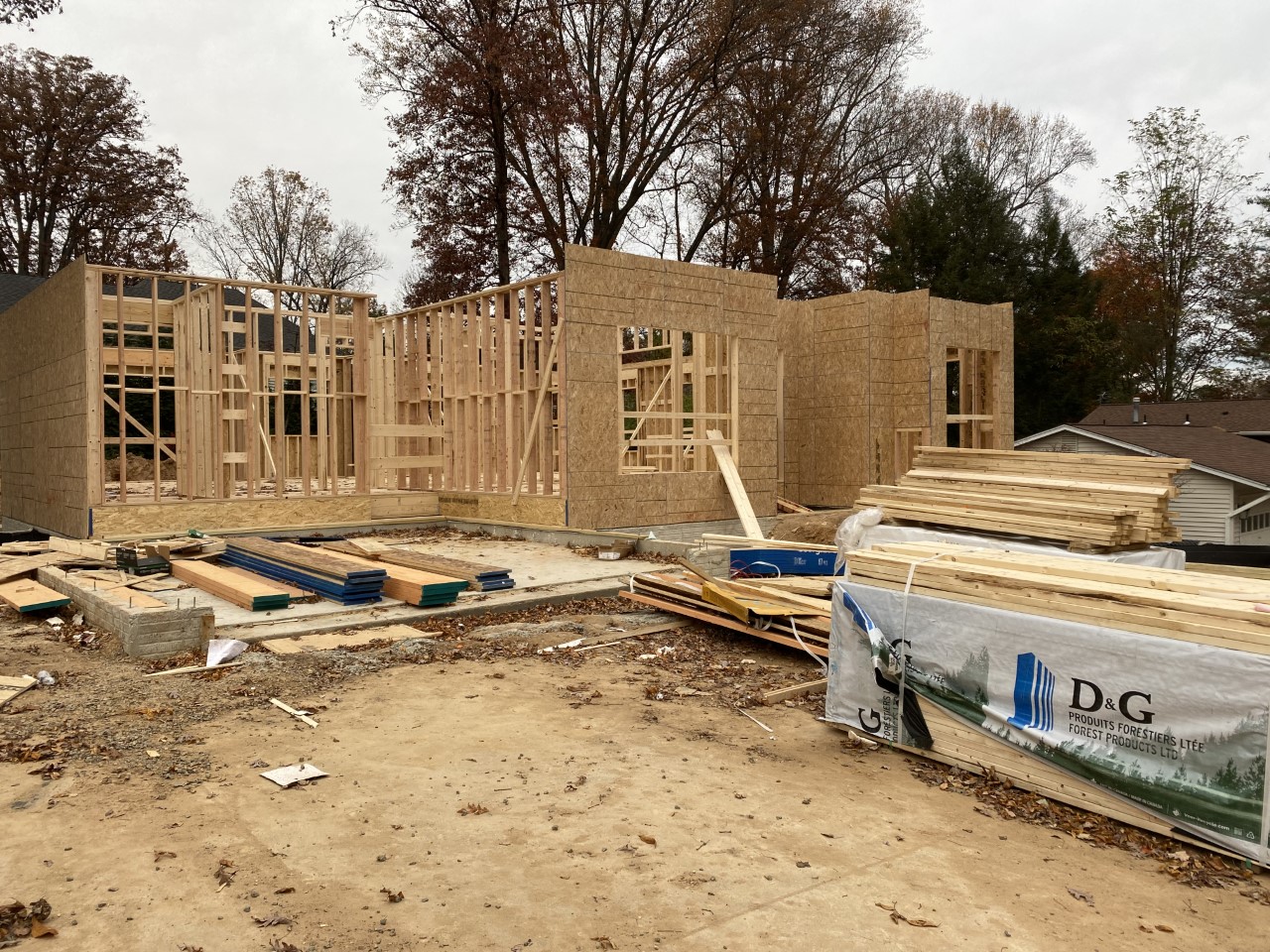1-5-22 Under Construction Glenda Simpkins Hoffman
Last May, our neighbors across the street retired and moved to North Carolina. Their house sat empty for some months, a sad reminder of the absence of their presence in our neighborhood. In August, the house came down in a single day. Then a hole was dug, and for some months a foundation and basement were being built.
In October, the new, much bigger house began to go up rather quickly with frames, then walls. The roof was completed before Christmas, and windows were installed this week. Every weekday, there are people working diligently, and I see evidence of their amazing progress in this house being built.
In addition, every day as I drive to work, I see progress on the construction of the new storage units on Mill Street. After many months of watching the individual interior units being framed and power put in, the exterior is now underway. But there is still much to be done.
It seems fitting that these construction projects should be before me every day as we begin a new year and a new sermon series—Under (Re)Construction: The Book of Nehemiah. I’m looking forward to hearing our lead pastor Hope Lee as she preaches and helps us to apply important lessons to our lives and particularly as God’s people here at VPC in this season in our church. The VPC daily devotions follow the sermon series. You can print them out or sign up to receive them in your inbox.
As we begin a new year and I watch a house going up before my eyes, I am already learning lessons about the nature of building a house. Construction of any kind requires intention and attention. Construction workers don’t simply start slapping together materials to make a house come together. There are plans that an architect has designed with intricate detail. There is intention—a plan to follow.
But of course, having the plan is not enough. There is also focused attention to making the vision of the house come into being. Certain materials are needed that have to be acquired. Then many people with a variety of skills and abilities work together using those materials and following the plan.
I marvel at the workers across the street who first started working when it was very hot and now continue when it is cold. Hour after hour, day after day, each person gives their attention to doing their part to help the building come together. As they do, a beautiful house is being built. Their example speaks to me.
The truth is that most of are not building an actual house, but let’s be clear: our lives are always under construction. We are in the process of becoming like Christ together for the world. This is the work of God’s Spirit in all who trust in Christ. But it doesn’t just happen magically. Rather, God invites us to participate with him in our growth and transformation as the Spirit conforms us to the image of Christ.
As a new year looms before us, do you have a vision for the abundant life and loving relationships God wants you to enjoy in this coming year? Do you know how to live more fully into that way of life? What is your intention for this year? What will you give your attention to in this coming year?
During the week between Christmas and New Year’s Day, I always make time to reflect on the last year and how I have seen God at work in my life. And I think and pray about the coming year. How is God inviting me to partner with him as the Spirit transforms me, connects me to others in community, and uses me in Christ’s ongoing work in the world? God wants us to live with intention and attention as we learn to love him with all our hearts, souls, mind, and strength and to love our neighbors as ourselves.
New Year’s resolutions are popular for many, but I do not believe they really change us. They rely too much on will power, and the will has no power. It is our natural inclination to try to change ourselves on our own. We seek to exert tremendous willpower to bring about transformation that we desire, but this will never work and often leaves us feeling frustrated and defeated. What is needed is not willfulness but willingness.
Richard Foster shares, “When we engage in spiritual disciplines, we are seeking the righteousness of the kingdom of God that comes through ‘indirection.’ You see, we cannot by direct effort make ourselves into the kind of people who can live fully alive to God. Only God can accomplish this in us. Only God can incline our heart toward him. Only God can reprogram the deeply ingrained habit patterns of sin that constantly predispose us toward evil and transform them into even more deeply ingrained habit patterns of ‘righteousness and peace and joy in the Holy Spirit’ (Rom. 14:17). And God freely and graciously invites us to participate in this transforming process. But not on our own; … to move forward in this life, we must understand clearly what a Spiritual Discipline is in the first place. A Spiritual Discipline is an intentionally directed action by which we do what we can do in order to receive from God the ability (or power) to do what we cannot do by direct effort.”1
Spiritual disciplines are ways that we can live with intention so that we give our attention to God and his will for our lives. They are means of grace that enable us to participate indirectly in what God is doing in and through us.
In his wonderful book You Are What You Love, James A. K. Smith says that our habits actually reflect what we love, and what we love is what we become. That’s why spiritual practices are the habits that God can use to change us.
The Bible is a blueprint for living, and we can’t really know how to do it without reading and studying it. So we give our attention to God by reading his word to listen to his voice so we can know him better and to understand his way and his will for our lives. Prayer is the way we also give our attention to God by engaging in an ongoing conversation. In corporate worship, we come together as God’s people to praise and celebrate who God is and to give thanks to him as his beloved children.
These are the classic spiritual disciplines, but there are many others. (Adele Calhoun describes 84 in her highly engaging and accessible book Spiritual Disciplines Handbook.) Again, these practices don’t change us, but they are ways we live with intention and attention as we give ourselves to God and allow him to do his work in us.
Living in community is also an important way we experience God’s love in our lives and share his love with others. A new year is a great time to begin new things. I encourage you to explore the many learning communities and small groups that are available. If you have not yet found one, please believe there is a group for you. Kim Snyder and I and other staff are eager to help you find one.
We are all under construction both individually and collectively as the body of Christ here at VPC. The only question is what that will look like at the end of the year. Our intention and attention will determine the outcome, so I encourage you to take time to consider what that will look like for you in 2022.


